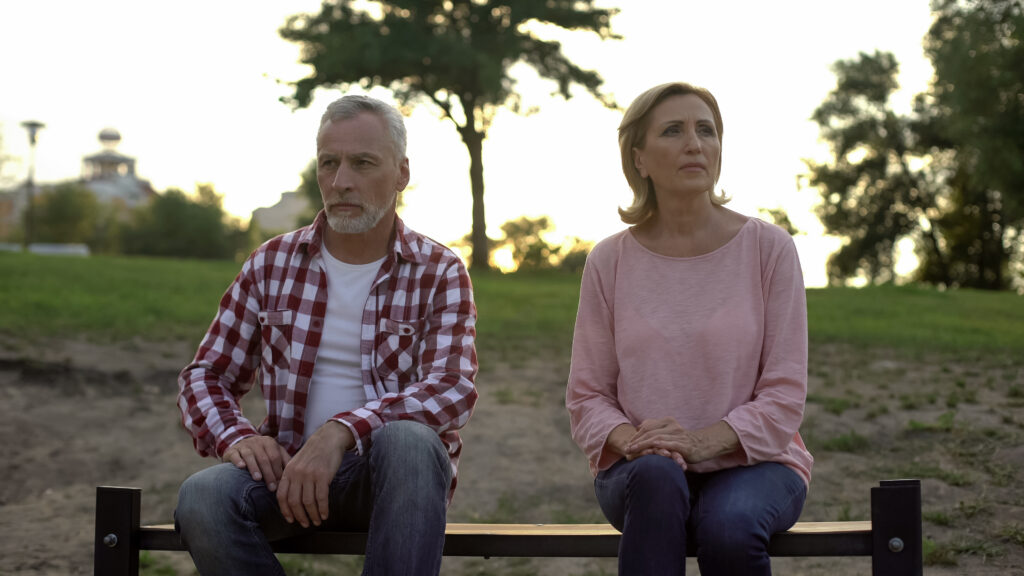Ignoring these marriage myths could be the biggest mistake of your life and lead to heartbreak you never saw coming.

You think you know what makes a marriage work? Think again. For years, older couples have quietly navigated the winding, often unpredictable road of married life, and now they’re opening up about what they wish they had understood from the start. It turns out that many of the popular beliefs and so-called “rules” surrounding marriage may actually do more harm than good. These aren’t just minor misunderstandings; some of these myths can quietly erode even the strongest relationships if left unchecked.
From the romanticized ideas about love to misguided notions of communication and compromise, these lessons shine a light on the realities that too many people learn only after years of struggle. If you want to build a lasting, fulfilling relationship, it’s time to challenge these common misconceptions and embrace a more grounded, honest approach to partnership. The wisdom shared here could reshape the way you view your own relationship and possibly save you from years of unnecessary heartache.
1. Thinking Love Alone Will Keep You Together Is a Dangerous Lie

Love is undeniably the emotional spark that draws two people together, but it’s far from the all-powerful force that many believe will carry a marriage through decades of life’s inevitable storms. Older couples confess that while love provided a strong foundation in the early years, it was their consistent effort in communication, patience, and mutual respect that truly sustained their connection. Love alone can easily be drowned by unaddressed issues, unmet expectations, and external pressures if both partners aren’t actively nurturing the relationship, according to Liz Richardson at BuzzFeed.
Over time, real-life responsibilities—work, children, finances, aging parents—test even the deepest emotional bonds. Those who assume love will automatically weather these storms often find themselves blindsided when challenges arise. It’s not the absence of love that causes marriages to crumble, but rather the absence of the daily actions that reinforce it. The couples who thrive are the ones who remain intentional, choosing each other again and again, even when it’s hard.
2. Believing You’ll Always Like Each Other Will Set You Up for Disappointment

Even the most devoted couples experience moments of frustration, irritation, and emotional distance. Expecting to always feel fondness and affection for your spouse is unrealistic and can set you up for unnecessary disappointment when natural ebbs occur. Older couples are quick to admit that there were times they genuinely didn’t like each other, whether due to disagreements, personality clashes, or the simple wear and tear of daily life, as shared by staff at Couples Counseling Chicago.
However, disliking each other in certain moments doesn’t spell doom for the marriage. It’s part of the human experience. What matters is the willingness to work through those moments, to step back and remember the larger picture of why you chose to build a life together. The healthiest marriages allow room for both love and temporary frustration, knowing that commitment is about enduring the ups and downs, not expecting constant harmony.
3. Thinking Your Partner Can Read Your Mind Will Only Lead to Heartache

Expecting your spouse to intuitively know your needs, feelings, and thoughts is one of the quickest ways to breed resentment and disconnection. Many older couples admit they once made the mistake of assuming their partner “should just know” what they were feeling or expecting. Unfortunately, mind-reading isn’t a skill anyone possesses, and unspoken expectations often turn into silent disappointments.
The couples who learned to voice their emotions, needs, and concerns found that open communication was the true foundation of understanding, as reported by Jill Webber at Psychology Today. Speaking up removes the guesswork and prevents misunderstandings from festering into larger issues. When both partners feel safe expressing themselves without judgment, they create an environment where emotional intimacy can flourish. Clear, honest dialogue isn’t just helpful—it’s essential.
4. Believing That Fighting Means You’re Not Meant to Be Is Just Plain Wrong

Conflict is not a sign of a broken relationship; it’s a natural part of sharing your life with another person. Older couples emphasize that it’s not the presence of conflict that determines a marriage’s success but how each partner handles it. Fights that spiral into personal attacks or unresolved grudges can certainly damage a relationship, but disagreements handled with respect and empathy can actually strengthen the bond.
Healthy conflict allows both people to express differing perspectives, work through disagreements, and ultimately grow closer by understanding each other’s needs better. Learning to fight fair—by listening, staying calm, and focusing on the problem rather than attacking the person—turns arguments into opportunities for growth. Conflict, when managed well, can be a pathway to deeper understanding and intimacy.
5. Expecting Your Spouse to Make You Happy Will Lead to Resentment

Many enter marriage believing that their partner is responsible for their happiness, but older couples caution that this mindset is a recipe for disappointment and bitterness. Happiness is something each person must cultivate within themselves. While a supportive partner can contribute to your joy, they cannot fill every emotional gap or solve your inner struggles.
When one partner depends entirely on the other to provide happiness, it creates unrealistic pressure and often leads to frustration when those expectations aren’t met. The healthiest marriages are built between two individuals who each bring their own sense of fulfillment and emotional well-being to the relationship. From that foundation, they support and enhance each other’s lives without becoming emotionally dependent.
6. Thinking Marriage Gets Easier with Time Is a Fantasy

Many people assume that with enough years under their belts, marriage naturally becomes smoother. But older couples know that every stage of life introduces new complexities to navigate. Children, careers, aging, health issues, and financial shifts all bring unique challenges that require constant adaptation.
Rather than expecting smooth sailing, successful couples approach marriage as an ongoing project that demands consistent care and attention. They understand that difficulties will arise and that facing them together is what ultimately strengthens the relationship. Growth happens when both partners remain flexible and willing to adjust to life’s shifting landscape, rather than waiting for an imagined point when everything magically falls into place.
7. Believing You’ll Always Be Physically Attracted to Each Other Is Unrealistic

Physical attraction naturally evolves over time as bodies change and life takes its toll. Older couples recognize that while initial chemistry may fade or transform, deeper forms of attraction often emerge. Emotional intimacy, shared memories, and mutual respect become the new anchors of desire and connection.
Rather than mourning lost youth, thriving couples learn to appreciate the unique beauty that comes with aging together. Small gestures, affectionate touch, and intentional efforts to maintain emotional closeness can reignite the spark in meaningful ways. Physical attraction may not look the same as it did at the start, but it can still be vibrant and fulfilling when both partners nurture it intentionally.
8. Assuming You’ll Always Be on the Same Page About Money Is a Huge Mistake

Money remains one of the most persistent sources of conflict in marriage, regardless of how long you’ve been together. Older couples reveal that financial disagreements don’t automatically disappear with time or experience. Life transitions—such as having children, changing careers, or preparing for retirement—frequently introduce new financial tensions.
The couples who weather these storms successfully are those who treat money management as a joint venture. They engage in ongoing, honest conversations about budgets, savings, debts, and long-term goals. Flexibility and transparency are key, as unexpected expenses and differing spending habits will inevitably arise. By maintaining open dialogue and shared responsibility, couples can transform financial stress into an opportunity for partnership and teamwork.
9. Thinking Kids Will Strengthen Your Marriage Is a Myth

Children bring immense joy and purpose, but they also add significant pressure to a marriage. Older couples acknowledge that parenting can easily overshadow the relationship if couples aren’t careful. Sleepless nights, differing parenting styles, and the sheer exhaustion of raising children often leave little time or energy for each other.
Rather than assuming that children will automatically bring you closer, successful couples prioritize maintaining their connection amid parenting demands. They carve out intentional time for one another, continue to nurture their bond, and recognize that a strong marriage forms the foundation of a healthy family. Loving your children and investing in your marriage are not mutually exclusive—both require care and attention.
10. Believing That Date Nights Are Optional Could Be the Beginning of the End

As life becomes busier, it’s easy for couples to let romance and quality time slip through the cracks. Older couples caution that neglecting these small but meaningful moments can slowly erode intimacy. Date nights aren’t just about going out—they’re about intentionally reconnecting and making each other a priority.
Even simple activities like sharing coffee, taking a walk, or cooking together can keep the emotional connection alive. Regularly carving out time to enjoy each other’s company helps sustain the bond that first brought you together. The happiest couples treat these moments as essential, recognizing that consistent connection is what keeps the relationship vibrant over time.
11. Expecting Your Spouse to Stay the Same Person Forever Is a Recipe for Trouble

Change is inevitable, and both partners will evolve throughout the course of a marriage. Older couples emphasize that resisting this growth or longing for the person your spouse used to be can create distance and frustration. Instead, they encourage embracing each other’s personal development with curiosity and support.
By remaining open to who your partner is becoming, you allow the relationship to adapt and flourish. Growth doesn’t have to mean growing apart. When both partners make room for each other’s evolving interests, dreams, and personalities, they cultivate a dynamic partnership that can withstand the tests of time.
12. Thinking You Should Always Agree to Keep the Peace Is a Trap

While avoiding conflict may seem like a way to preserve harmony, it often leads to suppressed emotions and unresolved issues. Older couples warn that consistently sacrificing your own voice can breed quiet resentment that eventually bubbles to the surface in destructive ways.
Healthy marriages allow space for differing opinions and honest conversations. Disagreements handled with respect and empathy can actually strengthen mutual understanding. Speaking up, even when it’s uncomfortable, demonstrates trust and vulnerability—both essential components of emotional intimacy. True peace comes from resolving issues, not from pretending they don’t exist.
13. Believing You’ll Never Feel Lonely in a Marriage Is a Hard Truth to Swallow

Even in the closest marriages, moments of loneliness can creep in. Life’s demands, shifting interests, or emotional disconnection can create temporary feelings of isolation. Older couples acknowledge that marriage doesn’t eliminate loneliness entirely—but it does offer opportunities to address and heal it.
The key is to recognize these moments without shame and to reach out to your partner with openness and honesty. Reconnecting may require intentional effort, such as shared activities, deeper conversations, or even seeking outside support. While loneliness may visit from time to time, couples who actively nurture their bond find that they can navigate these moments and emerge even stronger together.
